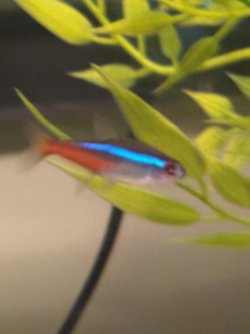Thanks for the reply. As I mentioned above, I'm looking at other housing options for the guppies but I plan on keeping the tetras and betta together. After doing some research (thanks everyone here for informing me of some mistakes!) I think that with less fish in the tank it will result in less fighting, I'm also thinking about upgrade to a 20 gallon to give the tetras more space. I understand that you have a lot more experience than me in this but I'm not sure I agree with everything your saying I think I can make it work once I fix everything else in the tank if its just the 4 tetras and one betta. Any advice on treatment for the tetra?
Many of our members come here for advice as they are new to the hobby, so I am going to take the time to explain things a bit more for you. This is not just an argument, it is hopefully a learning tool.
Having studied fish physiology, one thing must be remembered. The behaviours, expectations, traits, needs, etc. of a fish species is programmed into their DNA. None of us is going to change this. The fish is the way it is because it has evolved to be the way it is. Individual fish of a species, just like individual animals and even humans, can sometimes differ from the norm for the species, but with fish that cannot be relied upon just to try something that the majority knows will harm the fish. It is not fair to the fish.
The scientific facts concerning the species
Betta splendens are as follows:
Betta splendens seems to live solitary in its natural habitat which is still and sluggish waters, including rice paddies, swamps, roadside ditches, streams and ponds. Such an environment is not conducive to fish that require oxygenated waters so one can expect few if any non-anabantid species to live in such habitats. During the dry season, most Bettas are able to bury themselves in the bottom of their dried up habitat. There, they can live in moist cavities until water once again fills the depression during a rainy period. The fish can survive even if thick, clay mud is all that is left of the water. They do not survive total drying out of the bottom (Vierke 1988). There are very few fish species, and none that are found in the same habitats, that can manage life in such conditions, which is further evidence that the B. splendens is most likely a solitary species.
All anabantids are territorial; male bettas instinctively fight each other in defending their territory. Selective breeding over many years has produced fish with a heightened sense of territory defense, which explains the common name of Siamese Fighting Fish. Fish fights for money is a "sport," if you want to use the term for such animal cruelty. This means the Bettas we see in stores have an even greater propensity to literally kill each other given the chance. For a fish that instinctively lives alone, and believes it must defend its territory to survive--both traits that are programmed into the species' DNA--this aggressiveness is likely to extend to any fish that dares enter the Betta's territory, which in most cases will be the tank space. And forcing the fish to "live" under such conditions is frankly inhumane.
Individual fish within a species do not always adhere to the "norm" for the species; this is true of all animals, including humans. But with fish, responsible aquarists should research the fish's behaviours, traits, and requirements, and then aim to provide accordingly. "Expectations" are as I said above programmed into the DNA, and we are not going to change them just because we may want to have a Betta in the tank with "x" fish species. Sometimes the Betta seems to co-operate with our experiment, but in many of these situations it may not last for long, eventually if not immediately. Fish that do succumb are likely being severely stressed, unseen to the aquarist until it is too late.
If the Betta does not first attack the intruders, the intruders may go after the Betta. It is a two-way street, and in either situation it is the Betta that loses in the end. Severe stress causing increased aggression, or conversely severe withdrawal from being targeted by the other fish. And physical aggression is not the only concern; fish release pheromones and allomones, chemical communication signals that other fish read, and these can promote aggression that will in time weaken the fish to the point of death. There is no reason to risk the fish in one's attempt to prove scientific understanding wrong.


